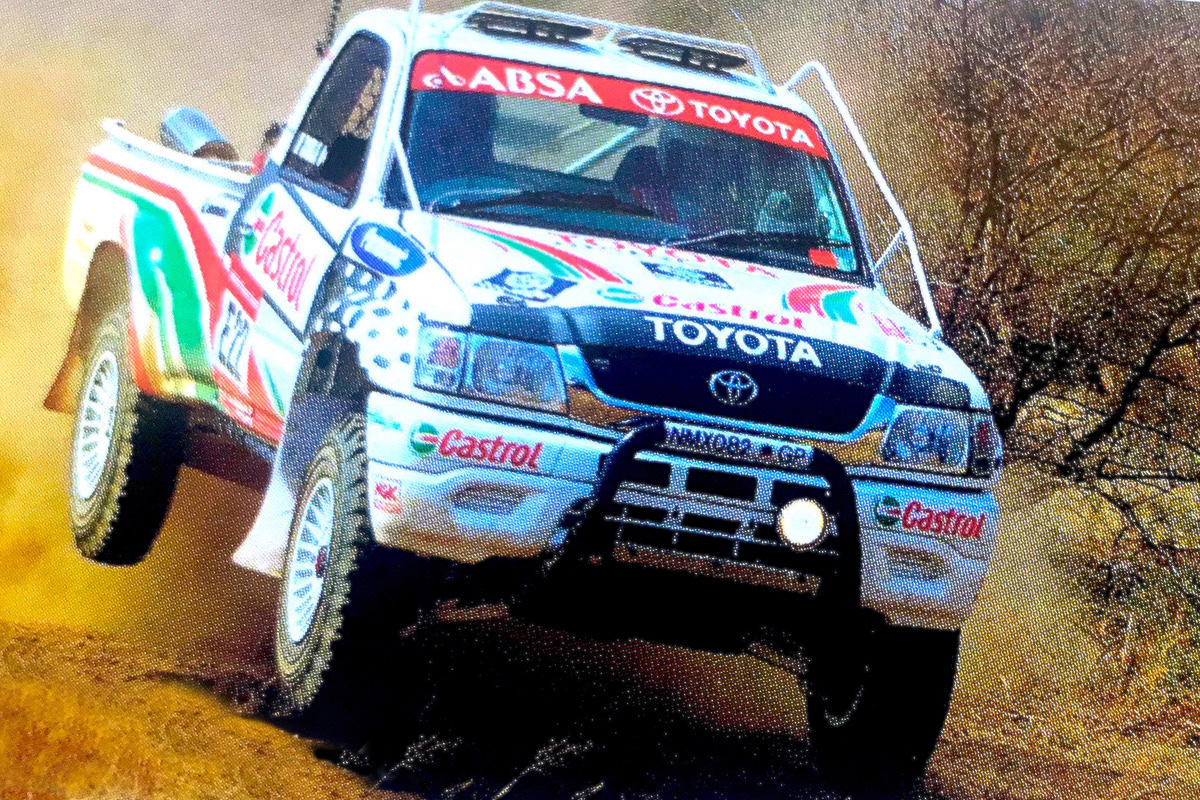Hilux Race History Part 2: Toyota knows Hilux winning Saturday, sells on Monday
Toyota Hilux Race History – start at the beginning if you’ve not read it all yet!
Part 1 – the early years
Part 2 – racing into the new millennium
Part 3 – local domination and the Dakar dream – live Wednesday 15 December
Part 4 – SA Gazoo Hiluxes on top of the world! – live Wednesday 22 December
Following its formative years in the previous millennium, off-road racing took a major step towards today’s cross-country era. The world had overcome the disappointment of the Y2K bug failing to stop the planet in its tracks, but another failure was about to change the South African motorsport landscape for once and for all.
The year 2000 demise of the South African Touring Car Championship on track however unlocked sizeable budgets for other forms of racing. Toyota was riding the crest of the wave as Apie Reyneke ruled the off-road roost in his works Castrol Toyota Land Cruiser, when Ford and Nissan re-joined the fray to significantly increase manufacturer representation in the series.
A JUNIOR FOCUS FOR HILUX
That, in effect, ushered in an a far more professional era that would soon favour the big-spending factory teams. The racing had already become super competitive by 2001. Toyota Motorsport initially concentrated its efforts on Reyneke and his Land Cruiser chasing overall honours in the top Class T. The Hilux effort meanwhile focused on Classes D and E during in the early part of that decade.
The competitive Hilux Development Team aimed at in nurturing young driving talent. Toyota signed two pairs of South African kart champion brothers in Mark and Gavin Cronje and Paolo Piazza-Musso as part of a formidable Hilux line-up. Not only did that effort harvest great talent, but the youngsters delivered many a class and title win too.
Reyneke’s highly successful Land Cruiser had become redundant in the face of Glyn Hall’s ever-evolving Dakar Nissan Hardbodies. So, Toyota management tasked team manager Haddad to find a suitable vehicle to replace highly developed, if venerable ‘Cruiser. The budget to achieve that however proved beyond what the multifaceted Toyota team could muster and Toyota soon bailed out of Class T. That in turn caused the top class to collapse.
A NEW TOP CLASS ERA
The ashes of Class T however soon spawned something of a South African off-road racing phoenix. The series introduced the basis of the future SP Class in 2006, luring Toyota back to chase overall glory. The team entered Specials refugee Bevan Bertholdt. And former Junior Team charger Mark Cronje and in a pair of new Castrol-backed top class Hilux 4x4s.
Bertholdt ended up fifth in the ’06 title race, Cronje 12th. The following year saw Cronje claim fifth place in the title race, while Bertholdt suffered a season to forget. Cronje and the Castrol Toyota Hilux then came good in 2008.
The youngster, who had risen through the classes out of Toyota Motorsport’s Junior Team, won his first off-road race overall. He took a couple of seconds too. One of those was in the marathon 1000km Toyota Botswana Desert Race. Cronje went on to end up fourth overall in the championship chase.
HILUX ROOKIE UPSETS THE APPLECART
The Castrol Team Toyota squad then signed its former Touring Car driver Anthony Taylor for the 2009 season. Taylor began his off-road racing career in sensational style as upset the applecart to win on debut. He went on to finish sixth in the championship that year. SP Class Hilux teammate Hein Lategan finished behind him in sixth. He had a consistent season topped by a runner up slot along the way.
You may recognise Hein’s surname. He’s 2021 Gazoo Racing’s Toyota Hilux Dakar rookie and reigning double-South African Cross Country champion Henk’s dad…
It was however ten years before Hilux won its next South African championship following that Y2K Junior Team success. And it took a privateer to get that right. Chris Visser rivals, but also outfoxed the works to win the 2021 South African Championship. That was the Toyota Hilux’s thirteenth South African title
In spite of its factory effort being beaten by a privateer, Toyota became attracted to the allure of off-road racing. Hilux was already a runaway South African market success. It dominated local new vehicle sales charts month in and month out.
But a new era was dawning. Already a cornerstone of the South African economy, South Africa’s favourite bakkie was about to become central to a brand new plan to build and export Hiluxes around the world out of Toyota’s Prospection, Durban plant.
HILUX WINS SATURDAY, SELLS MONDAY
Toyota had meanwhile figured out that when its factory Hiluxes raced on Saturday, everything the team learned over the weekend is put to use in the workshop on Monday. Much of that experience duly trickles down to the engineering office. And those motorsport concepts and lessons eventually end up becoming production realities in the Hilux bakkies you and I can buy right now off our local Toyota dealer floor.
Realising that motorsport improves the breed and that its competition roots had such a profound effect on its home-bred Hilux market success, Toyota was plotting to ramp up its off-road racing efforts too. Winning was becoming more important than just competing. And Toyota Motorsport’s effort was on the brink of a Hilux Cross Country Racing revolution.
Come back next week to follow the next, most significant step in the rapidly developing Toyota Hilux racing legend…
Toyota Hilux Race History Index
Part 1 – the early years
Part 2 – racing into the new millennium
Part 3 – local domination and the Dakar dream – live Wednesday 15 December
Part 4 – SA Gazoo Hiluxes on top of the world! – live Wednesday 22 December







